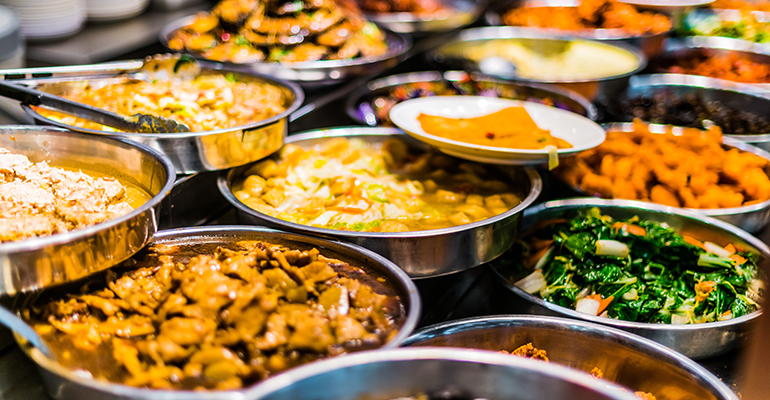News
Singapore positions itself as alternative protein pioneer
25 Apr 2023
Singapore is positioning itself as an innovative ecosystem for alternative proteins, with the Singapore Food Agency (SFA) approving cell-cultured chicken, protein made from carbon via precision fermentation, and several insects species in recent years.
In the evolving world of cultivated meat, Singapore continues to blaze a trail for others to follow with recent alt-protein approvals that further pushes mainstream approval and consumer acceptance of the innovation.

Just last week, the SFA provisionally approved crickets, silkworms, and grasshoppers for human consumption as part of plans to develop snacks and protein bars made from these insects.
This follows its approval of Finnish startup Solar Foods’ protein that is made from air. The ingredient is made from a blend of microbes, gases, and nutrients to form the nutrition-packed powder.
In 2020, the city state also approved Eat Just’s cell-based chicken. With these approvals, the country has emerged as a global protein hub for startups looking to develop animal-free options to conventional meat products.
“In recent years, Singapore has invested the necessary resources to make the city-state a welcoming ecosystem for food innovation and multilateral collaboration,” said Good Food Institute (GFI) APAC managing director Mirte Gosker.
“The Lion City is trading its traditional reliance on food imports for a new role as the place where the alternative protein sector’s biggest decisions are forged, announced, and exported to the world.”
Singapore is heavily reliant on food imports
Singapore’s emergence as a food-tech hub is in response to the country’s reliance on imports for more than 90% of its food, which leaves it exposed to shortages and price inflation.
In anticipation of future meat demand, its government has invested in alternative proteins and shaped a favourable regulatory environment that streamlines an otherwise complex and laborious process.
In 2019, the SFA published guidance on specific information requirements to be submitted for approval of cultivated meat and fermentation-enabled products.
 © AdobeStock/Ralf
© AdobeStock/Ralf
The publication has been updated three times, most recently in April 2022, to increase clarity on product tastings and sensory evaluations.
Overcoming the challenges of alt-meat adoption
As with all pioneering actions, Singapore will be the first among the region’s countries to encounter regulatory and commercial hurdles that at the very least will slow progress in alt-protein’s adoption.
Michal Klar, alternative protein investor, pointed out that Eat Just’s regulatory approval was product and process-specific and not a blanket approval for all cell-based products in Singapore.
It is not yet clear to if or when this approval will form the basis for a more comprehensive regulatory framework, he added.
Other factors include the location itself. Singapore is a very expensive destination to set up operations although its diverse consumer base and cuisine culture lends itself to experimentation of new foods.
“We believe the industry is still in its infancy,” Klar said. “The fundamentals driving the transformation remain strong – more sustainable protein production is key to addressing climate change and biodiversity loss.
“As the saying goes, people tend to overestimate how much can be done in one year, but underestimate how much it is possible to accomplish in 10 years.”
Related news

Bone broth: From old-fashioned to en vogue
24 Nov 2025
OXO’s entry into bone broth has turned the spotlight on this small but high-performance category – and there is still scope for growth, especially in the area of GLP-1 support.
Read more
Matcha madness: Why green is this year’s hottest colour
19 Nov 2025
Five years ago, it was a struggle to find matcha outside of Japan. Now it seems to be popping up everywhere, from coffee shops to supermarket shelves.
Read more
How younger consumers are redefining ingredient choices and rejecting brand loyalty
18 Nov 2025
Gen Z and millennial consumers’ preferences for transparency, functionality, and purpose are “redefining the very nature of consumption itself”, says SPINS.
Read more
Hybrid formats and flexible positioning to disrupt category norms in 2026
17 Nov 2025
Trend forecasters expect food and drink to move more fluidly across occasions, functions, and formats as consumers seek versatility, novelty, and convenience.
Read more
Empowering innovation in fortification and colouration
13 Nov 2025
Divi’s Nutraceuticals offers a large portfolio of innovative, high-quality ingredients for foods, beverages, and supplements, with bespoke solutions and expert support for product success.
Read more
Predictive maintenance redefines powder mixing reliability
13 Nov 2025
Mill Powder Tech's smart control systems harness real-time data to help the food and biotech sectors achieve zero downtime and smarter output, alongside rigorous GMP standards and ambitious ESG goals.
Read more
From fruit to functional solutions: Meet Paradise Fruits at Fi Europe in Paris
13 Nov 2025
Paradise Fruits Solutions and Paradise Fruits Health will showcase their combined expertise in delivering innovative, fruit-based solutions to the food and beverage industry at the upcoming Fi Europe trade show (2-4 December 2025, Paris).
Read more
Danone highlights digestive health as potential ‘tipping point’ for food industry
13 Nov 2025
Danone is betting on a food industry “tipping point” that will bloat the market for healthy products, particularly those related to gut health.
Read more
Bord Bia presents Irish dairy ingredient suppliers at Fi Europe
6 Nov 2025
Dairygold Co-operative Society, The Carbery Group, and Ornua Co-operative: Meet with sustainable producers of Irish dairy ingredients at Food ingredients Europe 2025, Hall 7.2 Stand M18.
Read more
Ingredient quantities mislabelled on popular protein bars, independent tests show
5 Nov 2025
Some popular protein bars contain more fat, carbs, and/or sugars than claimed on their labels, independent nutrition testing reveals.
Read more